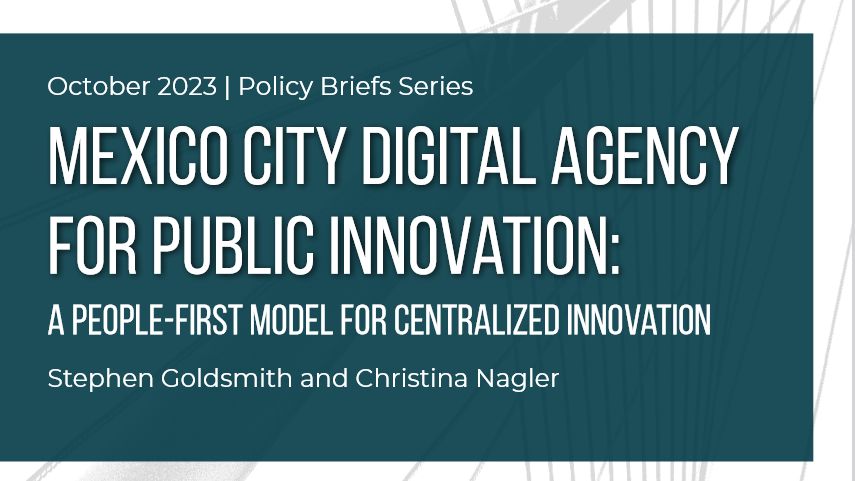- April 20, 2016
- Civic Engagement
Our #DataReads News series curates relevant news from our #ThisWeekInData posts for updates on different policy areas and civic data topics.
March 4, 2016: Tracking Birds to Find Illegal Garbage
Peru’s new way to find illegal garbage dumps: tracking vultures. The Ministry of the Environment launched a campaign called “Gallinazo Avisa” (translating to “Vultures Warn”) and attached GoPros to a flock of vultures, enabling real-time GPS data to be collected and analyzed to find areas likely to contain large garbage piles. The campaign has also resulted in an unexpected increase in civic engagement, drawing citizens’ attention to the problem of illegal garbage and increasing interest in wildlife and innovative government projects.
January 29, 2016: Boston's Collaborative Transportation Mapping
As part of the Vision Zero initiative to eliminate traffic fatalities, Boston launched a new collaborative online mapping tool where residents can denote their transportation-related safety concerns. The data from the new tool will allow Boston to better identify patterns and areas for improvement throughout the city. Vision Zero has been implemented in many major cities, and according to a recent piece in Pacific Standard analyzing the results of Vision Zero in New York City, it seems to be working to lower traffic fatalities and improve road safety.
October 16, 2015: New York's Neighborhood Information Platform
2014 BigApps winner Vizalytics made the news this week with New York City’s announcement of neighborhoods.nyc, a new platform for neighborhood-specific information in the city. The real-time data available will include 311 requests, construction alerts, and transit and traffic information. The city hopes that community partners will use the site and add their own data and engagement opportunities for residents.
October 16, 2015: New York's Citizen Innovation Contest
New York City’s BigApps, a competition that solicits technology solutions to civic challenges, closed its latest round of project submissions. This year, BigApps sought proposals in four areas: affordable housing, zero waste, connected cities, and civic engagement. Writing in NextCity, Kate Daly of the New York City Economic Development Corporation highlighted past winners and emphasized the importance of citizen innovators to the city.
September 18, 2015: Civic Interventions in Mexico City
MIT’s Center for Civic Media joined up with Mexico City’s civic innovation team, Laboratório para la Ciudad, to experiment with collaborative civic interventions with local partners. They identified ways to increase citizen voice and engagement in developing the Action Path app that allows smartphone users to submit feedback to the government directly, according to Civicist. Among the most important lessons is that citizens have unique insight into the dynamics of their city and should be deeply involved in governance.
September 11, 2015: Habitat III's Meeting on Civic Engagement
Digital tools are championed in the name of citizen engagement, often to connect citizens to services. However, choosing the format for civic engagement, whether digital or analog, involves assessing what sort of engagement you’re after. Speaking at theHabitat III thematic meeting on civic engagement, part of the preliminary work for the 20-year urbanization strategy called theNew Urban Agenda that will come out of next year’s U. N. cities conference, Joan Clos, the secretary-general of Habitat III, said “Civic engagement is about the roots of democracy...It’s about the personal rights of humans to have a say in their everyday life and the form of urbanization,” Citiscope reports. In other words, civic engagement is about the right to the city. That will require traditional face to face civic engagement as well as technological platforms. The work ahead is finding the right role for both.
September 6, 2015: Civic Engagement's Democratic Roots
One way to characterize the major stakes in civic engagement is to distinguish between citizens and customers. On Medium, Dave Mckenna says it’s often easy to forget that local government is a democratic institution — not just a vehicle for service delivery.The conventional wisdom is that people only care about their local governments in as far as they provide services in a cost effective way. Of course schools, social care, and refuse collection are nothing less than essential for people’s quality of life and they have every right to demand that they are provided well. But people also care about the decisions that affect them, the opportunity to vote, the conduct of their representatives, and the policies of those in charge. These are not services — they are aspects of democracy.
September 6, 2015: Experts Can't Solve City Problems Alone
Writing for Next City, Steven Bingler explains why experts alone can’t solve city problems by showing how New Orleans citizens saved their city after Katrina. It pivots on how you define leadership. In virtually every institution, there are advocates for strong top-down strategies on one side, and robust bottom-up models on the other. But when management systems are truly humming, both sides usually come together in the middle. Nowhere is this merger more urgent, more demanding—and more revealing—than in the wake of a major disaster.
September 6, 2015: How Crowdsourcing Can Help the GSA
For US News and World Report, Niam Yaraghi, a fellow in the Brookings Institution's Center for Technology Innovation, considers the implications of the an agreement between Yelp, the crowdsourced review website, and the U.S. General Services Administration (GSA) to allow its agencies to claim their pages and read and respond to reviews. An upside is that it opens a new avenue for government to assess its services and for citizens to express their concerns--and the GSA cleverly used Yelp’s proven existing infrastructure to open a new way for citizens to engage with government, while saving taxpayers precious dollars on developing and testing an website in-house. However, getting lasting value from the agreement will require building capacity that ties the coming deluge of feedback to responsive action.
August 21, 2015: Austin: Using Reddit for Civic Engagement
Facebook and Twitter have become civic engagement mainstays, but Reddit, one of the most tech-minded online communities goes largely ignored. Now that's beginning to change in Austin, says GovTech. Where civic engagement is concerned, Austin, Texas, is perhaps the only government to avail itself of a free platform for civic engagement that reaches about 200 millionhighly engaged, unique monthly visitors.
August 21, 2015: Leveraging Customer Feedback in Government
In a new paper on customer-driven government, Jane Wiseman of the Institute for Excellence in Government explores how we can improve government service delivery by using customer feedback in the same way private sector industries have to make better business decisions.
August 7, 2015: Improving Customer Satisfaction
GCN summarizes a Forrester Research report on how government can improve citizen satisfaction. To keep up with public expectations, Forrester found governments must do four key things. Improving the government customer experience requires accelerating the pace toward digital government through integrated mobile and analytics technologies and practices.
July 31, 2015: Revamping Civic Engagement
Nextgov, Josh Plaskoff says government needs to revamp the way it interacts with citizens. Recent surveys show low “customer satisfaction” and trust levels with federal agencies. Citizen experience, or CX, is more than improving call center metrics; it involves a holistic look at how and where citizens interact with government and improving these touch points to meet their expectations.
July 31, 2015: Civic Engagement Through GIS Storytelling
Snow Journal, a model use of GIS storytelling for civic engagement, was named grand prize winner of the recent worldwide Esri Storytelling with Maps contest, among other public sector winners. Along with the grand prize, the program won first place for “Best Infrastructure, Planning and Government,” GCN reports. Snow Journal uses maps, narrative text, images and multimedia to tell the story of how boston handled its historically snowiest winter.
July 24, 2015: Automating Citizen Requests with IBM's Watson
IBM’s Watson technology is being incorporated into an app for requesting city services in Surrey, BC, a major suburb of Vancouver. Watson's sophisticated language and data analysis system can interpret requests automatically, according to FastCoExist.
July 17, 2015: Blueprints for Inclusive Hackathons
Jeanne Brooks, Director of Global Communities at DataKind, and Lam Thuy Vo, an interactive editor for Al Jazeera America, set a rigorous blueprint for designing more inclusive hackathons. And elsewhere in civic tech, GCN provides a checklist for creating relevant, user friendly, and responsive open data portals. StateTech shows how governments are tapping interactive audiovisual solutions to boost public engagement and enhance participation.
July 17, 2015: Government as a Social Network
At Data-Smart, Professor Stephen Goldsmith shows how thinking about government as a new social network brings into focus progressive possibilities, which give the underserved and underrepresented a chance to express their views and needs while evaluating their services.
June 26, 2015: How Open Data Increases Civic Engagement Potential
Writing for a Data-Smart series that explores data-related facets of civic engagement in today’s cities, Emily Shaw, Deputy Policy Director at the Sunlight foundation, explains how open data fuels the kind of two-way communication that increases opportunities for the public to interact with government, while allowing for local governments to maximize the value of their data.
June 19, 2015: South Bend's CityVoice: A New Town Meeting Model
Trust between government and the public is a two way street. That’s why cities are finding new ways to listen to their citizens and enable them to solve problems together.The City of South Bend is taking advantage of new communication technologies to remake the town meeting with CityVoice, a place-based call-in system that gathers rich, direct community feedback on physical features of the city, says Code for America.
June 19, 2015: Co-Created Governance in Mexico City
Mexico City’s new traffic app, Living Mobs, uses data to enable citizens to solve their problems together in real time, a form of co-created governance that brings citizens into public decision making by building a community culture in concert with municipal government, Next City reports.
June 19, 2015: Digital Tools to Create a More Inclusive Government
Here at Data-Smart, Hollie Russon Gilman explores opportunities for using digital tools to create more inclusive and collaborative structures for governance that ensure citizen engagement is translated directly into improved policy outcomes.
June 12, 2015: Developments in Civic Activism
Last week, social activists, policy makers, and social entrepreneurs gathered for the the 2015 Personal Democracy Forum (PDF), a chance to consider the latest developments in civic activism. Writing for the Stanford Social Innovation Review, Marcia Stepanek unpacks the conversation as it moved from responsive technologies to co-created governance. The lesson: citizen engagement means building better government with citizens, not for them.
May 22, 2015: LinkNYC's Citizen Engagement Potential
Capital New York reports the new payphone wi-fi program Link NYC has the potential to be a "platform for citizen engagement" by letting citizens rank local issues, like education, on the unit’s display.
May 22, 2015: Philadelphia's Customer Service Principles
Pulling from the city of Philadelphia’s highly active twitter feed and video interviews, Route Fifty explores key principles of the customer service experience from Philadelphia’s chief customer experience strategy, innovation, and technology officer, Rosetta Carrington Lue. The priority? People want information now.
May 15, 2015: Kansas City's Revamped Citizen Survey
Here on Data-Smart City Solutions, Laura Adler examines how Kansas City, Mo., is using a revamped citizen survey to take account of how well residents believe the city is performing. She also takes a look at how cities are harnessing technology to monitor air quality and the effects of pollution.
May 1, 2015: Ensuring Community Voices are Heard
On Data-Smart City Solutions, Tim McNaught takes a look at solutions for amplifying community voices, and Benjamin Shaffer examines strategies for engaging everyone, both part of our series recapping insights from the March 2015 convening of the Project on Municipal Innovation Advisory Group.
April 24, 2015: Tel Aviv's DigiTel: A "One-Stop Shop" for Civic Engagement
Aiming to change the way citizens interact with municipal departments, Tel Aviv launched DigiTel, a “one-stop shop” that puts all the services provided by the municipality into a single place. The project combines “e-government” basics such as online bill payment with mobile apps and social media, Citiscope reports.
April 17, 2015: New York City's Accessible City Council
New York City released Council 2.0, aimed at engaging citizens and community organizations with city government by making the council an open, digitally agile institution able to solicit feedback on legislation and make its data and activities accessible to the public, according to Next City.
April 10, 2015: Ohio's Online Checkbooks
Ohio State Treasurer Josh Mandel wants to expand a program to put the state and local governments’ checkbooks online to show residents how their communities and schools are spending money with just a few clicks, Cleveland.com reports.
April 10, 2015: Denver's PocketGov: Saving Money and Improving Services
Writing for Stephen Goldsmith’s “Better, Faster, Cheaper” column in Governing magazine, Charles Chieppo examines Denver PocketGov, an innovative website that promises to save taxpayers money while improving the services they get.
April 3, 2015: Knight Cities Challenge Winners
The Knight Foundation announced the 32 winners of the inaugural Knight Cities Challenge, a competition that drew more than 7,000 applications for projects seeking to creatively improve a community. Several winning proposals drew on digital tools for community engagement.
April 3, 2015: Philadelphia's Live Streamed Press Conferences
Philadelphia is experimenting with Meerkat, the live-streaming mobile app, to broadcast mayoral press conferences to the public, State Technology magazine reports.
March 20, 2015: ChicagoCode.Org
Chicago relaunched ChicagoCode.org, an open legal code website that helps make the municipal code more accessible and understandable for citizens, Government Technology magazine reports.
February 6, 2015: Boston's Real-Time Snow Removal Updates
In a week that saw the latest downfall of a heavy snow season in Boston, city officials launched a website called Snow Stats that allows citizens to get real-time progress reports on snow and ice removal efforts in their neighborhoods, the Boston Globe reports.
January 23, 2015: Snowplow-tracking Apps
Snowplow-tracking apps released by Chicago, New York, Seattle, and other cities are empowering residents and holding local officials accountable for their snow-storm responses, the Associated Press reports.




